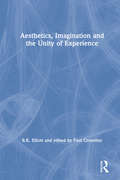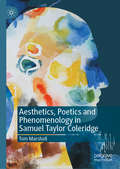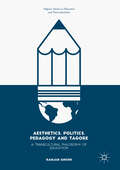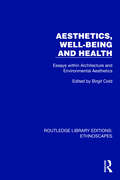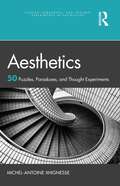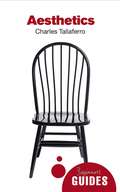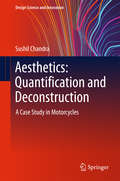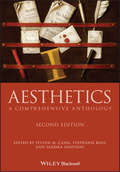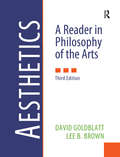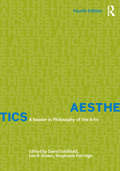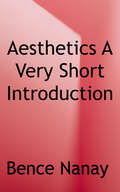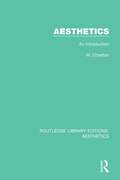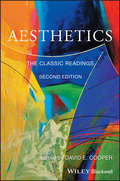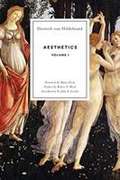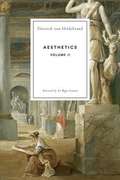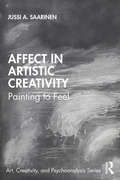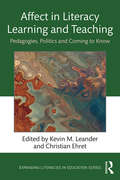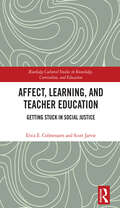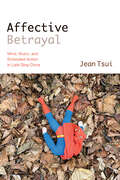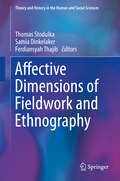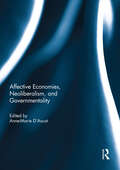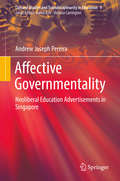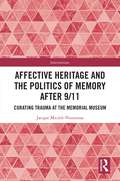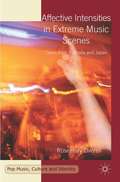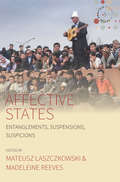- Table View
- List View
Aesthetics, Imagination and the Unity of Experience
by R.K. Elliott edited by CrowtherThis is the first book to gather together R. K. Elliott's important essays on aesthetics. These essays put forward a number of common themes that together constitute a unified approach to aesthetics. A theory of imagination is developed and ideas concerning the practice of art criticism are explored before the relevance of aesthetics for ethics is discussed. Throughout his writing Elliott combines analytic rigour with sympathy for ideas in continental philosophy. He values subjectivity but his analytic stance prevents this from falling into mere personal opinion; he is also able to show how art and aesthetic theory is of complex relevance to broader areas of experience such as education, freedom, and moral action. In the course of his discussion Elliott offers an in-depth analysis of Kant's Critique of Judgement, Clive Bell's aesthetic theory, and the relevance of Wittgenstein for aesthetics. Study of Elliott's essays presented in this book powerfully illuminates the unifying role of imagination and the aesthetic in human experience.
Aesthetics, Poetics and Phenomenology in Samuel Taylor Coleridge
by Tom MarshallThis book re-evaluates the philosophical status of Samuel Taylor Coleridge by providing an extended comparison between his work and the phenomenological theory of Edmund Husserl. Examining Coleridge’s accounts of the imagination, perception, poetic creativity and literary criticism, it draws a systematic and coherent structure out of a range of Coleridge’s philosophical writing. In addition, it also applies the principles of Coleridge’s philosophy to an interpretation of his own poetic output.
Aesthetics, Politics, Pedagogy and Tagore: A Transcultural Philosophy of Education (Palgrave Studies in Education and Transculturalism)
by Ranjan GhoshThis book provides a radical rethinking of the prominent Indian thinker Rabindranath Tagore, exploring how his philosophy of education relates to the ideas of Western theorists such as Kant, Plato and Aristotle. Tagore's thoughts on pedagogy, university and formal education are subjected to a fascinating critique within Ghosh's transcultural framework, referencing a wide range of thinkers across varying time periods, places, and cultures, and developing a greater sensitivity to other traditions, languages, and forms of thinking and writing. The book changes the way we have so far thought about the educationist Tagore, and will be of interest to scholars and specialists of literature, Indian history, and philosophy of education. It is political, deeply philosophical and has a transcultural take on our understanding of a variety of issues relating to Tagore and to philosophy of education in general.
Aesthetics, Well-being and Health: Essays within Architecture and Environmental Aesthetics (Routledge Library Editions: Ethnoscapes)
by Birgit ColdIn everyday life, most people do not reflect seriously on the impacts of architecture and environmental aesthetics on their well-being and health. Originally published in 2001 as part of the Ethnoscapes: Current Challenges in the Environmental Social Sciences series, reissued now with a new series introduction, Aesthetics, Well-being and Health: Essays within Architecture and Environmental Aesthetics, is an intriguing volume bringing together professionals working in architecture, planning, urban design and social policy with academics from both humanities and social sciences to provide a broad-based and insightful discussion on how aesthetics affect us emotionally and physically. The essays help us understand our cultural and individual preferences related to the quality of the environment and challenge the common belief that environmental beauty is a matter of personal taste. A wide range of concepts are discussed such as place identity, multi-sensuous and emotional processes, geometrical order and controlled space, architectural plasticity, aesthetically real and virtual values, participative design processes, ethics in architecture, and beauty and happiness. The book highlights the importance for today's society to engage more in aesthetic ethics and to understand the significance of creating aesthetically pleasing environments.
Aesthetics: 50 Puzzles, Paradoxes, and Thought Experiments (Puzzles, Paradoxes, and Thought Experiments in Philosophy)
by Michel-Antoine XhignesseAesthetics: 50 Puzzles, Paradoxes, and Thought Experiments is a teaching-focused resource, which highlights the contributions that imaginative scenarios—paradoxes, puzzles, and thought experiments alike—have made to the development of contemporary analytic aesthetics. The book is divided into sections pertaining to art-making, ontology, aesthetic judgements, appreciation and interpretation, and ethics and value, and offers an accessible summary of ten debates falling under each section. Each entry also features a detailed annotated bibliography, making it an ideal companion for courses surveying a broad collection of topics and readings in aesthetics. Key Features: Uses a problem-centered approach to aesthetics (rather than author- or theory-centered) making the text more inviting to first-time students of the subject Offers stand-alone chapters, allowing students to quickly understand an issue and giving instructors flexibility in assigning readings to match the themes of the course Provides up-to-date, annotated bibliographies at the end of each entry, amounting to an extensive review of the literature on contemporary analytic aesthetics
Aesthetics: A Beginner's Guide (Beginner's Guides)
by Charles TaliaferroWhat is art? Why do we find some things beautiful but not others? Is it wrong to share mp3s? These are just some of the questions explored by aesthetics, the philosophy of art. In this sweeping introduction, Charles Taliaferro skilfully guides us through notions of art and beauty around the world, tackling lively debates such as who owns art and how art and morality collide. From Plato on poetry to Ringo Starr on the drums, this is a perfect introductory text for anyone interested in the intriguing questions art can raise. Charles Taliaferro is Professor of Philosophy at St. Olaf College, Minnesota. He is the author of over twenty books on philosophy and lectures on Aesthetics and the Philosophy of Religion.
Aesthetics: A Case Study in Motorcycles (Design Science and Innovation)
by Sushil ChandraThis book addresses a perennial challenge for product planners and designers alike: how to objectively specify and quantify the aesthetics of products. It provides automotive product planners with a framework for the grammar of aesthetics and a tool for quantifying the aesthetics of an intended product. Further, it equips styling designers with a tool for connecting engineering and aesthetics. Given the author's extensive experience in motorcycle design, the motorcycle has been chosen as the frame of reference for automobiles. Specifically in the field of automobile design, where engineering and aesthetics go hand in hand, it also becomes important to clearly and objectively define the relationship between engineering design and aesthetics. Accordingly, this book (1) clearly establishes the objective parameters of aesthetics, (2) puts forward a method for quantifying aesthetics, (3) identifies the engineering design parameters affecting aesthetics, and (4) determines the relationship between parameters of aesthetics and engineering design. As such, it offers a useful guide not only for design professionals, but also for students and researchers of design.
Aesthetics: A Comprehensive Anthology (Blackwell Philosophy Anthologies #19)
by Steven M. Cahn Sandra Shapshay Stephanie RossA revised second edition of the bestselling anthology on the major figures and themes in aesthetics and philosophy of art, the ideal resource for a comprehensive introduction to the study of aesthetics Aesthetics: A Comprehensive Anthology offers a well-rounded and thorough introduction to the evolution of modern thought on aesthetics. In a collection of over 60 readings, focused primarily on the Western tradition, this text includes works from key figures such as Plato, Hume, Kant, Nietzsche, Danto, and others. Broad in scope, this volume also contains contemporary works on the value of art, frequently-discussed continental texts, modern perspectives on feminist philosophy of art, and essays by authors outside of the community of academic philosophy, thereby immersing readers in an inclusive and balanced survey of aesthetics. The new second edition has been updated with contemporary essays, expanding the volume’s coverage to include the value of art, artistic worth and personal taste, questions of aesthetic experience, and contemporary debates on and new theories of art. This edition also incorporates new and more standard translations of Kant's Critique of the Power of Judgment and Schopenhauer's The World as Will and Representation, as well as texts by Rousseau, Hegel, DuBois, Alain Locke, Budd, Robinson, Saito, Eaton and Levinson. Presents a comprehensive selection of introductory readings on aesthetics and philosophy of art Helps readers gain a deep historical understanding and clear perspective on contemporary questions in the field Offers new essays specifically selected to promote inclusivity and to highlight contemporary discussions Introduces new essays on topics such as environmental and everyday aesthetics, evolutionary aesthetics, and the connections between aesthetics and ethics Appropriate for both beginning and advanced students of philosophical aesthetics, this selection of texts initiates readers into the study of the foundations of and central developments in aesthetic thought.
Aesthetics: A Reader in Philosophy of the Arts
by David Goldblatt Lee B. BrownAs with previous editions, the new Aesthetics: A Reader in Philosophy of the Arts uses classic and contemporary readings of leading philosophers of the arts. This Third Edition includes more than a dozen new essays either written or adapted especially for this volume. Containing more than 90 essays in total, the new edition offers generous choices for class readings, thus minimizing supplementary material needed for required assignments and independent research. In keeping with earlier editions, the Third Edition is a large collection of essays, most comparatively brief and organized first by groupings of art forms and then by general essays about the arts. It attempts to keep pace with theorizing about those art forms not traditionally covered in most books on aesthetics, like the jazz, rock, comics, video games, and even the aesthetics of junkyards. There is, then, an emphasis on the popular and mass arts and everyday aesthetics, as well as on time-honored problems in philosophy of the arts. This edition, which contains contributions by both analytic and continental philosophers, expands upon offerings in non-Western art and aesthetics. Finally, although intended to keep pace with topics and issues currently debated, instructors and students will find, in a special section, key classic texts.
Aesthetics: A Reader in Philosophy of the Arts
by David Goldblatt Stephanie Patridge Lee B. BrownAesthetics: A Reader in Philosophy of the Arts, fourth edition, contains a selection of ninety-six readings organized by individual art forms as well as a final section of readings in philosophical aesthetics that cover multiple art forms. Sections include topics that are familiar to students such as painting, photography and movies, architecture, music, literature, and performance, as well as contemporary subjects such as mass art, popular arts, the aesthetics of the everyday, and the natural environment. Essays are drawn from both the analytic and continental traditions, and multiple others that bridge this divide between these traditions. Throughout, readings are brief, accessible for undergraduates, and conceptually focused, allowing instructors many different syllabi possibilities using only this single volume. Key Additions to the Fourth Edition The fourth edition is expanded to include a total of ninety-six essays with nineteen new essays (nine of them written exclusively for this volume), updated organization into new sections, revised introductions to each section, an increased emphasis on contemporary topics, such as stand-up comedy, the architecture of museums, interactivity and video games, the ethics of sexiness, trans/gendered beauty, the aesthetics of junkyards and street art, pornography, and the inclusion of more diverse philosophical voices. Nevertheless, this edition does not neglect classic writers in the traditional aesthetics: Plato, Aristotle, Hume, Kant, Hegel, Heidegger, Collingwood, Bell, and writers of similar status in aesthetics. The philosophers writing new chapters exclusively for this fourth edition are: • Sondra Bacharach on street art • Aili Bresnahan on appreciating dance • Hina Jamelle on digital architecture • Jason Leddington on magic • Sheila Lintott on stand-up comedy • Yuriko Saito on everyday aesthetics • Larry Shiner on art spectacle museums in the twenty-first century • Peg Brand Weiser on how beauty matters • Edward Winters on the feeling of being at home in vernacular architecture, as in such urban places as bars.
Aesthetics: A Very Short Introduction (Very Short Introductions Ser.)
by Bence NanayAesthetics is a branch of philosophy that explores the nature of art, beauty, and taste. It doesn't just consider traditional artistic experiences such as artworks in a museum or an opera performance, but also everyday experiences such as autumn leaves in the park, or even just the light ofthe setting sun falling on the kitchen table. It is also about your experience when you choose the shirt you're going to wear today or when you wonder whether you should put more pepper in the soup. Aesthetics is everywhere. It is one of the most important aspects of our life.In this Very Short Introduction Bence Nanay introduces the field of aesthetics, considering both Western and non-Western aesthetic traditions, and exploring why it is sometimes misunderstood or considered to be too elitist - by artists, musicians, and even philosophers. As Nanay shows, so-called"high art" has no more claims on aesthetics than sitcoms, tattoos, or punk rock. In fact, the scope of aesthetics extends far wider than that of art, high or low, including much of what we care about in life. It is not the job of aesthetics to tell you which artworks are good and which ones are bad.It is not the job of aesthetics to tell you what experiences are worth having. If an experience is worth having for you, it thereby becomes the subject of aesthetics. This realisation is important, because thinking about aesthetics in this inclusive way opens up new ways of understanding oldquestions about the social aspect of our aesthetic engagements, and the importance of aesthetic values for our own self.
Aesthetics: An Introduction (Routledge Library Editions: Aesthetics #2)
by W. CharltonFirst published in 1970. What is a work of art? What is the status of things in pictures and books? How are we to distinguish and ascertain the meaning of a literary work at various levels? This book is intended both to introduce the reader to classic philosophical accounts of art and beauty, and to bring out the significance for aesthetics of recent developments in philosophy.
Aesthetics: The Classic Readings (Philosophy: The Classic Readings #67)
by David E. CooperThe newly expanded and revised edition of Cooper’s popular anthology featuring classic writings on aesthetics, both historical and contemporary The second edition of this bestselling anthology collects essays of canonical significance in aesthetics and the philosophy of art, featuring a wide range of topics from the nature of beauty and the criteria for aesthetic judgement to the value of art and the appreciation of nature. Includes texts by classical philosophers like Plato and Kant alongside essays from art critics like Clive Bell, with new readings from Leonardo da Vinci, Oscar Wilde, Walter Pater, Ronald W. Hepburn, and Arthur C. Danto among others Intersperses philosophical scholarship with diverse contributions from artists, poets, novelists, and critics Broadens the scope of aesthetics beyond the Western tradition, including important texts by Asian philosophers from Mo Tzu to Tanizaki Includes a fully-updated introduction to the discipline written by the editor, as well as prefaces to each text and chapter-specific lists of further reading
Aesthetics: Volume I
by Dietrich Von HildebrandWritten in the early 1970s during the last years of his life, as if harvesting a lifetime of reflection, Aesthetics is Dietrich von Hildebrand’s comprehensive two-volume study and defense of beauty and art. With the publication of Aesthetics, Hildebrand becomes a contemporary spokesman and defender of the importance of beauty at a time when many think that beauty is relative and art unnecessary. Aesthetics: Volume I is Dietrich von Hildebrand's comprehensive work on beauty translated by Brian McNeil.
Aesthetics: Volume II
by Dietrich Von HildebrandWritten in the early 1970s during the last years of his life, as if harvesting a lifetime of reflection, Dietrich von Hildebrand's Aesthetics is a uniquely encompassing work.The first volume develops an original theory of the beautiful, and the second applies that theory with tremendous breadth and attention to the various types of artwork and to many of the world's most beloved works of art. <P><P> It is a testament to the work's broad significance that two of the most respected voices in contemporary aesthetics have joined together to offer forewords to each volume: Dana Gioia to Volume I, and Sir Roger Scruton to Volume II. <P><P> Sir Roger Scruton writes on Volume II: "In this second volume of his treatise on the subject Hildebrand assembles the results of a lifetime's thought about the arts, and expresses his devotion to beauty in terms that the reader will find immediately engaging." <P><P> He continues: "Most philosophers of aesthetics content themselves with a few examples from the realm of art, and make no attempt to explore the distinct disciplines or to catalogue all the parts that contribute to the overall aesthetic effect. One purpose of this second volume, however, is to show the completeness of the artistic enterprise, and the way in which it penetrates human life in its entirety, so that the idea of beauty enters our practical activity at every point." <P><P> Dietrich von Hildebrand's Aesthetics occupies a place in the great philosophical aesthetic tradition of Plato, Kant, and Hegel, while incorporating the fresh and fundamental insights of phenomenology. With this publication of the first English translation, Dietrich von Hildebrand becomes a contemporary spokesman and defender of the importance of beauty and aesthetic values at a time when many think that beauty is relative and art unnecessary.
Affect in Artistic Creativity: Painting to Feel (Art, Creativity, and Psychoanalysis Book Series)
by Jussi SaarinenWhy do painters paint? Obviously, there are numerous possible reasons. They paint to create images for others’ enjoyment, to solve visual problems, to convey ideas, and to contribute to a rich artistic tradition. This book argues that there is yet another, crucially important but often overlooked reason. Painters paint to feel. They paint because it enables them to experience special feelings, such as being absorbed in creative play and connected to something vitally significant. Painting may even transform the painter’s whole sense of being. Thus, painting is not only about producing art, communicating content, and so on, but also about setting up and inhabiting an experiential space wherein highly valued feelings are interactively enabled and supported. This book investigates how and why this happens by combining psychoanalytical theorization on creativity with philosophical thinking on affectivity. It focuses on creative experience itself, and illuminates the psychological mechanisms and dynamics that underlie the affects at stake. Painters’ own descriptions of how they feel at work are used throughout to give an accurate, true-to-life portrayal of the experience of painting. The strength of the book lies in its open-minded yet critical integration of contemporary psychoanalytic and philosophical thinking, and in its truthfulness to painters’ experiential descriptions of the painterly process. On the whole, it enriches our understanding of artistic creativity and sheds more light on how and why we come to feel the things we do. As such, the book will appeal to philosophers, psychoanalysts, and art researchers alike.
Affect in Literacy Learning and Teaching: Pedagogies, Politics and Coming to Know (Expanding Literacies in Education)
by Kevin M. Leander Christian EhretIn this cutting-edge volume, scholars from around the world connect affect theory to the field of literacy studies and unpack the role and influence of this emerging area of scholarship on literacy education. Offering an introduction to affect theory and scholarship as it relates to literacy studies, contributors discuss the role of humanizing and dehumanizing influences on schooling and examine the emotional and affective dimensions at individual and communal levels. Arguing that an affective turn requires a radical rethinking of the nature of literacy, these chapters address the impact and import of emotion and affect on reading, writing and calling to action. Grounded in trailblazing research, the contributors push the boundaries of academic writing and model how theoretically-driven writing about affect must itself be moving and expressive.
Affect, Learning, and Teacher Education: Getting Stuck in Social Justice (Routledge Cultural Studies in Knowledge, Curriculum, and Education)
by Erica E. Colmenares Scott JarvieThis volume inquires into student teachers’ “stuck moments”—moments of felt crisis—as they occur within the context of a university-based social justice teacher education (SJTE) program. The book complicates the notion that these stuck moments are primarily effects of a gap between theory and practice. Instead, Colmenares and Jarvie argue for a more robust conceptualization, drawing on affect theory, posthumanism, and Deleuzian scholarship. By considering what stuck moments do, and do to, student teachers, the book reimagines SJTE in ways that are both responsive to stuckness and disruptive of discourses of learning that dominate the field. Through a critique of the affective workings of learning, the authors consider how these discourses can prove counterproductive for the work of teaching for social justice. This insightful and stimulating volume will be of use to scholars, researchers, and students with interests in curriculum studies, affective approaches to education and SJTE.
Affective Betrayal: Mind, Music, and Embodied Action in Late Qing China (SUNY series in Chinese Philosophy and Culture)
by Jean TsuiAffective Betrayal uses "affect" as an analytical category to explicate the fragility and fragmentation of Chinese political modernity. In so doing, the book uncovers some of the unresolved moral and philosophical obstacles China encountered in the past, as well as the cultural predicament the country faces at present.At the turn of the twentieth century, China's leading reformer Liang Qichao (1873–1929) presented modern political knowledge in musical and visual representational formats that were designed to stimulate readers' bodily senses. By expanding the reception of textual knowledge from "reading" to "listening" and "visualizing experiences," Liang generated an epistemic shift, and perhaps an all-inclusive internal intellectual, philosophical, and moral transition, alongside China's modern political reform. By tracing the marginalized academic and philosophical positions Liang sought to restore in China's incipient democratic movement, Affective Betrayal examines how his attempts to conjoin Confucian morality and liberal democracy expose hidden anxieties as well as inherent contradictions between these two systems of thought. These conflicts, besides disrupting the stability of China's burgeoning modern political order, explain why the import of modern concepts led to China's continued political impasse, rather than rationality and progress, after the 1911 revolution.
Affective Dimensions of Fieldwork and Ethnography (Theory and History in the Human and Social Sciences)
by Thomas Stodulka Samia Dinkelaker Ferdiansyah ThajibThis book illustrates the role of researchers’ affects and emotions in understanding and making sense of the phenomena they study during ethnographic fieldwork. Whatever methods ethnographers apply during field research, however close they get to their informants and no matter how involved or detached they feel, fieldwork pushes them to constantly negotiate and reflect their subjectivities and positionalities in relation to the persons, communities, spaces and phenomena they study. The book highlights the idea that ethnographic fieldwork is based on the attempt of communication, mutual understanding, and perspective-taking on behalf of and together with those studied. With regard to the institutionally silenced, yet informally emphasized necessity of ethnographers’ emotional immersion into the local worlds they research (defined as “emic perspective,” “narrating through the eyes of the Other,” “seeing the world from the informants’ point of view,” etc.), this book pursues the disentanglement of affect-related disciplinary conventions by means of transparent, vivid and systematic case studies and their methodological discussion. The book provides nineteen case studies on the relationship between methodology, intersubjectivity, and emotion in qualitative and ethnographic research, and includes six section introductions to the pivotal issues of role conflict, reciprocity, intimacy and care, illness and dying, failing and attuning, and emotion regimes in fieldwork and ethnography. Affective Dimensions of Fieldwork and Ethnography is a must-have resource for post-graduate students and researchers across the disciplines of social and cultural anthropology, medical anthropology, psychological anthropology, cultural psychology, critical theory, cultural phenomenology, and cultural sociology.
Affective Economies, Neoliberalism, and Governmentality
by Anne-Marie D’AoustAdvanced capitalism is characterized by a level of symbolic production that not only results in a dematerialization of labor, but also increasingly relies on highly emotional components, ranging from consumption desire to workforce management. Feelings as varied as love, anger, and desire are integral to neoliberal processes, though not in unproblematic and monolithic ways. Whereas some accounts decry capitalism’s hold on the emotional realm, as the commodified search for soul mates through online dating sites or Starbucks’ promotion of fair-trade coffee suggest, others counter that emotions represent a privileged site of resistance to market rationality. Relying on different case studies ranging from drone strikes, the 2008 economic crisis in Ireland, and marriage migration management, this volume builds on this productive tension between subjection and resistance through the lenses of the concept of governmentality. Developed by Michel Foucault, governmentality sheds light on the ways in which economic and political life are now being managed through logics of security and economic calculations. This volume explores how individuals might become emotionally attached to regimes of power that are detrimental to them, how neoliberal processes are concomitant with the valorization of certain emotional dispositions, and how affective economies might provide a site of resistance. This book was published as a special issue of Global Society.
Affective Governmentality: Neoliberal Education Advertisements in Singapore (Cultural Studies and Transdisciplinarity in Education #9)
by Andrew Joseph PereiraThis book investigates the subjectivities in education arising from the triumphant mobilisation of care as portrayed in educational advertisements, and provides a novel theory of affective governmentality based on empirical research on affect, neoliberalism, and governmentality. It also takes the bold step of encouraging the re-imagination of the central and pressing question of school marketisation in Singapore, and problematises the seemingly innocuous portrayals of care in light of neoliberal governmentality seeking to perform cultural work on preferred identities and subjectivities. Using a judicious selection of media artefacts, the book scrutinises the creation of emotional technologies through an ethic of caring, harnessing vulnerabilities and triumphalism. As such it not only equips readers to understand the role of emotional technologies but also offers a critical and alternative view of hope and aspirations for transforming society.
Affective Heritage and the Politics of Memory after 9/11: Curating Trauma at the Memorial Museum (Interventions)
by Jacque Micieli-VoutsinasThis book critically examines the institutional curation of traumatic memory at the 9/11 Memorial Museum and its evocative power as a cultural storyteller. Memorial Museums are evocative spaces. Drawing on aesthetic practices deeply rooted in representing the ‘unrepresentability’ of cultural trauma, most notably the Holocaust, Memorial Museums are powerful, popular mediums for establishing cultural values, asking the visitor to contemplate "Who am I?" in relation to the difficult histories on display. Using primary data, this book poses important questions about the emotionally-charged site: what ‘moral lessons’ are visitors imparted with at the 9/11 Memorial Museum? Who is the cultural institution’s primary audience—the imagined community it reconstructs this traumatic history and safeguards its memories for? What does the National September 11 Memorial & Museum ultimately teach visitors about history, ourselves, and others? This work will be of interest to students and scholars in the areas of Human Geography, American Studies, Museum Studies and Public History, Cultural and Heritage Studies, and Trauma and Memory Studies.
Affective Intensities in Extreme Music Scenes
by Rosemary OverellAn ethnographic study of gender, place and belonging, Affective Intensities introduces readers to the embodied sensations, flows and experiences of being in extreme music scenes in Australia and Japan.
Affective States: Entanglements, Suspensions, Suspicions
by Madeleine Reeves Mateusz LaszczkowskiIn recent years, political and social theory has been transformed by the heterogeneous approaches to feeling and emotion jointly referred to as 'affect theory'. These range from psychological and social-constructivist approaches to emotion to feminist and post-human perspectives. Covering a wide spectrum of topics and ethnographic contexts-from engineering in the Andes to household rituals in rural China, from South African land restitution to migrant living in Moscow, and from elections in El Salvador to online and offline surveillance among political refugees from Uzbekistan and Eritrea-the chapters in this volume interrogate this 'affective turn' through the lens of fine-grained ethnographies of the state. The volume enhances the anthropological understanding of the various ways through which the state comes to be experienced as a visceral presence in social life.
